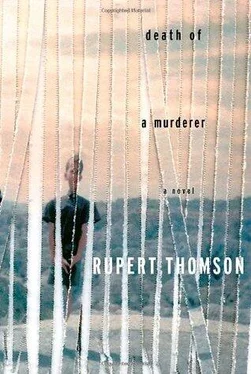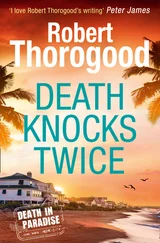He stared at her lowered head, the white line of her parting.
“I didn’t plan it,” she went on. “At least, I don’t think I did. It was a spur-of-the-moment thing.” She glanced at him quickly, through her hair, then let out a short, oddly resonant laugh.
He wasn’t sure what to say to her, but he also realised that he couldn’t leave too long a silence, and he knew he couldn’t judge.
“Tell me what happened,” he said quietly.
The journey north took longer than she’d expected, Sue told him, but it was only when they arrived at their hotel that Emma started playing up.
“She would have been tired by then,” Billy said.
Sue nodded. “You know how she gets.”
She was in the car-park, trying to unload the car, and Emma kept wandering out into the road. She spoke to Emma calmly, warning her, then she tried to bribe her, then she shouted. None of it worked. In the end, she had to half carry, half drag Emma up to their room, with Emma bellowing the whole way, that awful, almost inhuman bellowing she did, and all in front of the other guests, who were watching from the lounge.
“Sometimes you want to punch her on the jaw,” Sue said. “Just knock her out. Like they do in films.”
“It’s not that easy,” Billy said.
“Well,” Sue said, “you’d know, I suppose.”
They stayed in their room that evening and ate the sandwiches and chocolate that were left over from the journey; she couldn’t face the dining-room, not with all those people staring. Next morning, the weather was bright and clear. She stood at the window in her pyjamas, trying to shut the jabber of cartoons out of her head. Sun slanted across the hotel car-park. They would climb up to East Cliff, she decided. Visit the ruined abbey.
As they crossed the swing-bridge, Emma walked with her head tilted back and her mouth open, watching the seagulls as they wheeled, shrieking, above the harbour. The path to East Cliff was steep, and paved with slippery flagstones, but the two of them took it slowly, holding hands. By the time they reached the top, a cold wind was blowing in off the sea. It was a weekday, out of season; they were the only people there.
When Emma saw the abbey, she turned to Sue, her eyes glinting behind her spectacles. “Like Hunchback,” she said.
Billy grinned. “She loves that video.”
Later, as they explored the graveyard, Sue told Emma the story of Count Dracula. This was where he’d landed, she said, here in Whitby, during a ferocious storm. She led Emma towards the cliff-edge, thinking they might be able to work out where the vampire’s ship had run aground. Leaning forwards from the waist, hands clenched and pressed against her hips, Emma peered down — she was imagining how Dracula had changed into a great black dog and leapt ashore, perhaps, or else she was simply hypnotised by the rhythmic creasing and folding of the waves — and in that moment, as they stood next to each other, no more than twelve inches from the edge, Sue thought, She could fall, and then, without a beat, I could push her. It was a drop of at least two hundred feet. She wouldn’t have survived. Couldn’t have. I could push her now, Sue thought, and that would be the end of it. She hesitated for several seconds, then she took a step backwards. She was behind Emma now, but near enough to be partly covered by her shadow. All our troubles would be over. She stood in her daughter’s shadow, and she came so close to reaching out that her hands seemed to throb.
A terrible accident. A tragedy.
And since they were alone on that bleak cliff-top, who would have been able to prove otherwise?
She stepped back so abruptly that she bruised her leg on a gravestone. “Emma,” she said, “I think we should leave now.”
“Leave,” Emma said. “Go down.”
“That’s right, my darling. It’s lunchtime.” Sue reached for Emma’s hand and gripped it tightly.
“Fish and chips.”
Sue smiled. “If you like.”
In half an hour they were sitting in a restaurant on the waterfront, their cheeks glowing from the wind.
Sue’s eyes fixed on Billy’s face. “I came that close.” She measured a gap with her thumb and forefinger. A very narrow gap.
“It’s not just you,” Billy said. “I’ve thought the same thing.”
She pulled away from him. “You have?”
He poured another glass of wine. “Not exactly the same,” he said. “I just used to wish that she hadn’t been born.”
Except no, he thought, as soon as he had spoken, that wasn’t entirely accurate. Emma never came into it, not as a person. It was much more abstract than that. What he wished was that they’d been dealt a different hand. But Sue’s eyes had already drifted to the kitchen wall. She looked infinitely sad, and he knew that she was thinking about her only child — her brightness, and her burden. If Sue was ever out for very long, he would find Emma sitting by the window in the lounge, watching the road. Waiting for Mummy, she would say, and her voice would have something of the goose’s honk about it, as always. But Mummy’s going to be late, he’d say. She would glare malevolently at him through her thick spectacles. Put you in the tower.
“It hasn’t exactly been easy,” he said. “If we didn’t have thoughts like that sometimes, we wouldn’t be human.”
He wasn’t sure he was right, actually. It was just something to say. But at least they were equally at fault.
“The main thing is, you didn’t do it,” he said.
“I could have,” she said. “I almost did.”
She didn’t want him to dismiss the urge she had felt as a one-off, an aberration — the exception to the rule. It was serious, and real, and it was there all the time. That was what she was trying to tell him. It’s there all the time.
“You didn’t, though,” he said again, more gently. “You haven’t.” He left a silence, and then he took a risk. “You won’t.”
Getting up off his chair, Billy shivered suddenly and rubbed his arms. He thought he understood why Sue had begged him not to go to work that evening. She was aware of the fragility of things. Their life together. Their foothold in the world. She might feel neglected, undermined as well. She might even suspect him. Not that he was driving down to the Orwell estuary and sitting in a parked car on his own — though that was bad enough, maybe — but simply that there was often an hour in his schedule that wasn’t accounted for. Perhaps she imagined he was seeing someone…And now this job with so much grief and terror surrounding it, and so much rage — the way that could eat into your thoughts without your knowing. Something might give, something might crumple or blow, and then all the horrors would descend. She was afraid for him, for herself — for the whole family. The wall protecting them was so very thin. In fact, it was a miracle that it had held for as long as it had.
There was half an inch of coffee in the bottom of his cup, and though he knew it would have gone cold ages ago he drank it down, then leaned back in his chair and stretched, a loud, creaky sigh coming out of him, the kind of sound you don’t make unless you’re alone. It had taken him forty minutes to complete Rebecca’s continuation sheets— Nickname(s)/ Alias(es)… Becky, Becca — and it had only confirmed his anxieties.
When Billy walked into the Williamses’ house on Sunday afternoon, the radiators were icy, and there was dirt everywhere. On his way to the lounge, he glanced into the kitchen. Food had been thrown on the floor, and the sink was piled high with washing-up. Rubbish hung from the door-handles in Asda bags. There was something rotting in the microwave. It looked like part of a pizza.
Читать дальше












